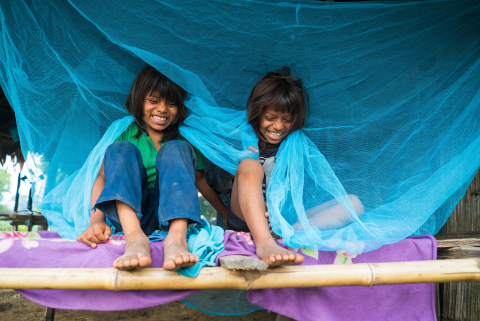Tuesday 13th September
Just a few days before the Global Fund’s Seventh Replenishment Conference, the malaria community is urging world leaders to deliver a fully replenished Global Fund to help save 20 million more lives from malaria, TB, and HIV over the next three years. This year’s conference takes place in the context of unprecedented global events, but world leaders are asked to remain steadfast in their commitment to funding and combatting these devastating diseases.
In the run up to the Replenishment Conference, the malaria community hosted a series of events, including events in Berlin, Canberra, Kigali, London, Paris, San Francisco, Tunis and Yaounde to advocate for the importance of global action on malaria and a fully replenished Global Fund.
Dr Corine Karema, Interim CEO of the RBM Partnership to End Malaria, commented:
“The RBM Partnership calls on all parties, including malaria-endemic and donor countries, private sector and philanthropic organisations, to pledge new and increased contributions to achieve the target of at least $US18 billion. Anything less than this puts the progress made over recent years to end malaria, at risk. We are already at a precarious juncture, with 627,000 lives lost to malaria in 2020, the highest in nearly a decade, an increase of 12 per cent compared to the year before.”
The latest Global Fund Results Report demonstrates the impact of previous country donations to the Global Fund. The Global Fund is among the most significant international financing mechanisms for malaria programs and has invested more than US$16.4 billion in malaria programmes, making it critical to malaria elimination efforts. In 2021 where the Global Fund invested, the Fund:
- Enabled testing of 280 million suspected malaria cases, registering significant gains in efforts to ensure all people who may have malaria are diagnosed.
- Facilitated treatment of 148 million malaria cases, continuing the recovery to ensure all people diagnosed with malaria are treated swiftly to prevent deaths.
- Provided 133 million mosquito nets to be distributed to protect families from malaria.
Dr Karema said:
“We are pleased to see some countries, such as Japan and Germany, have already announced significant pledges – Japan pledging up to US$1.08 billion and Germany pledging €1.3 billion. These are on top of the US$6 billion pledged by the US, this year’s host country. We hope to see other countries, especially the wealthiest ones, follow their lead and demonstrate leadership, commitment, and solidarity in the fight against these three devastating diseases.
Today a child still dies of malaria every minute – the time for countries to act is now. I am delighted to see the malaria community unite and make its voice heard in every corner of the world ahead of the Replenishment Conference. I hope governments not only listen but take action. With a fully replenished Global Fund, countries and partners can re-energise the fight against the disease, strengthen health systems for their readiness for future pandemics, and invest in further research and innovations to end malaria for good.”
The Global Fund Replenishment is critical to malaria efforts as it mobilizes and invests funding in malaria programme financing across 94 countries.
It is estimated that a fully replenished fund will:
- Reduce malaria cases by 66%, from 239 million in 2020 to 81 million in 2026.
- Increase coverage of insecticide treated nets in Africa from 43% in 2020 to 52% by 2026.
- Treat 550 million malaria cases through public sector systems between 2021 and 2026.
- Eliminate malaria from an additional six countries by 2026.
ENDS
About the RBM Partnership to End Malaria
The RBM Partnership to End Malaria is the largest global platform for co-ordinated action against malaria. Originally established as Roll Back Malaria (RBM) Partnership in 1998, it mobilizes action and resources and forges consensus among partners. The Partnership comprises more than 500 partners, including malaria endemic countries, their bilateral and multilateral development partners, the private sector, non-governmental and community-based organizations, foundations, and research and academic institutions. The United Nations Office for Project Services (UNOPS) in Geneva, Switzerland, hosts the RBM Partnership Secretariat.
Facebook: @RBMPartnership
Twitter: @endmalaria
